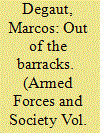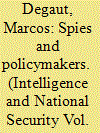|
|
|
Sort Order |
|
|
|
Items / Page
|
|
|
|
|
|
|
| Srl | Item |
| 1 |
ID:
135547


|
|
|
|
|
| Summary/Abstract |
As the 2014 FIFA World Cup in Brazil, held from June 12 to July 13 2014, has come and gone, the country’s logistics and infrastructure need to remain key topics of discussion. However, the same amount of attention has not been paid to a subject that is crucial to the success of one of the greatest sports events on the planet: security. More specifically, how are Brazilian public authorities dealing with the possibility of terrorist attacks in the country? Is this hypothesis being seriously considered?
|
|
|
|
|
|
|
|
|
|
|
|
|
|
|
|
| 2 |
ID:
163577


|
|
|
|
|
| Summary/Abstract |
Why some democratic revolutions succeed while others fail? The scholarly community has sought to address this issue from various perspectives, from rational choice approaches to collective action theories. Too little attention, however, has been paid to analyzing the role of the military. By discussing the different types of interactions played by the military in five cases of successful democratic revolutions—the 1910 Portuguese Republican Revolution, the 1958 Venezuelan Revolution, the 1960 April Revolution in South Korea, the 1989 Velvet Revolution in Czechoslovakia, and the 2000 Bulldozer Revolution in Yugoslavia—and three cases of failed revolutions, the 1905 bourgeois-liberal revolution in Russia, the 1989 Tiananmen Square Protests in China, and the 2016 Turkey’s coup attempt, this study finds out that the key factor in determining their outcome is the army’s response and that the military backing is a necessary condition for a democratic revolution to succeed.
|
|
|
|
|
|
|
|
|
|
|
|
|
|
|
|
| 3 |
ID:
145239


|
|
|
|
|
| Summary/Abstract |
Massive changes and continuous developments in the uses and applications of technology and communications have changed the way we see the world. The Information Revolution has had an impact upon intelligence collection, processing, analysis, and dissemination, and upon the way policymakers can access reliable information, in a timely manner, and upon the sources they are most likely to rely on when a specific piece of information is needed to support a decision. This study attempts to describe, analyze and explain the nature of the ongoing Information Revolution, to present its main impacts on the intelligence and policy communities, to discuss the relationship between the Intelligence Community and policymakers, and to propose what the IC should do to meet the high expectations of decision-makers.
|
|
|
|
|
|
|
|
|
|
|
|
|
|
|
|
|
|
|
|
|